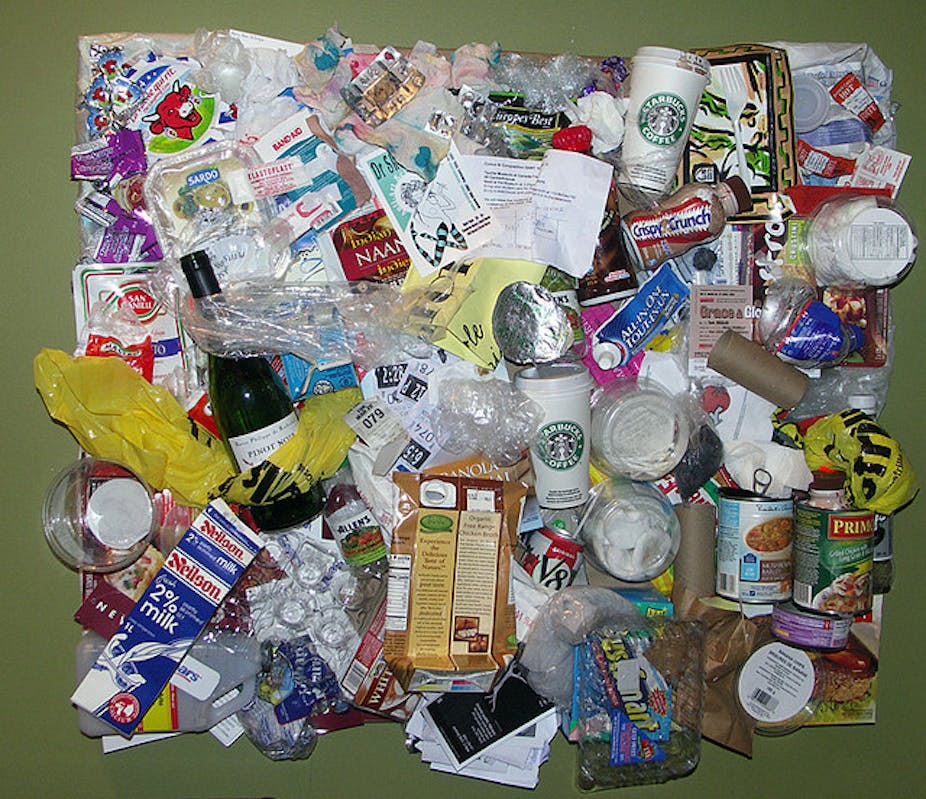The NHMRC’s new Australian dietary guidelines recommend eating more fruits, vegetables, legumes, beans and wholegrains and eating fewer starchy vegetables, refined cereals, red meat (unless you are a young female) and generally reducing foods high in fat, sugar, or salt.
Although it is probably not a surprise to most of us that fresh produce is healthier than junk food, cakes and soft drinks, the new guidelines remind us to renew our efforts to resist processed foods.
Besides being good for us, following these guidelines can be good for the environment. Knowing this may increase our motivation to alter our food choices.
Rubbish in, rubbish out
Highly processed foods usually come with a lot of packaging. A simple rule of thumb would be to avoid food that comes in a packet, because those foods are more likely to contain preservatives, salt, sugar and fat. The good news is that when you choose food that does not require packaging, such as fruits and nuts, you are making a healthy choice for both your body and the environment.
Whenever we choose tap water over a can of soft drink, we are helping the planet, our budget and ourselves. Soft drinks, juices, iced tea and even fancy water all come in plastic bottles. Although they can be recycled, most of these bottles are discarded in ways that pollute the environment.
Food containers and packaging make up most of the waste we discard. In the best scenario, the packaging our food and drink comes in end up in our municipal landfills, where it makes up the largest component. In the worst scenario, these items float down our rivers and out to sea, where they pollute our natural environments and put our wildlife at risk.
One of the largest environmental concerns of the century is the giant plastic ball of the southern ocean, also known as the Great Pacific Garbage Patch or the trash vortex. The rubbish created by modern society makes its way to the ocean where the currents have congregated it in the southern oceans in a giant plastic ball as large as Australia, and it is growing.
Plastic in the ocean is dangerous to turtles, birds and fish who ingest it. These animals are not able to discriminate between organic and non-organic debris, and many of them have evolved to scoop up anything floating on the surface of the ocean.
When their bodies are full of plastic, they can starve to death. Even when they survive, the rubbish that they have ingested contains toxins and other man-made pollutants.
Red meat is not green
Another NHMRC recommendation is reducing consumption of red meat. This is another win for the environment, because you can reduce your impact on climate change at the same time as reducing cholesterol.
Cattle produce large volumes of greenhouse gases, both in gaseous form (methane) and in solid form (their manure is full of nitrous oxide). In a UN Food and Agriculture Organisation report published in 2006, worldwide livestock farming was shown to generate more greenhouse gases than all the world’s cars, trains, planes and boats combined.
Worldwide, cultivation of meat is also a major driver of deforestation, which contributes to climate change by removing vegetation that holds onto carbon. In Australia, cattle contribute to the compaction of soils that cannot cope with hoofed animals. Cattle in many areas pollute our streams and contribute to erosion. Reducing the amount of red meat we eat has often been seen as a green choice among environmentalists.
Eating fresh whole foods that you have purchased using reusable shopping bags is the best approach for a healthy environment and a healthy family. The fact that these two noble goals do not conflict is great news for all of us. If you can’t be bothered changing your diet for your own health, change it for the good of the planet.

